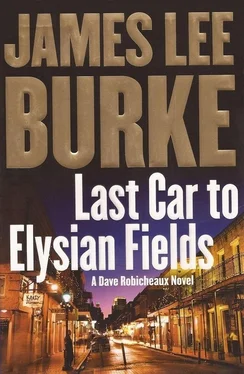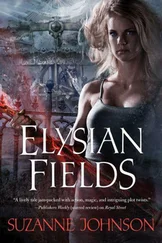Helen got out of her cruiser, her arms pumped, her shield hanging from a black cord around her neck. A cleaning woman was passing on the walkway, a plastic bucket filled with detergent bottles on her arm.
“You smell marijuana coming from that room?” Helen asked.
“Ma’am?” the cleaning woman said.
“That’s what I thought,” Helen said. She banged her left fist on the door of the room registered to Frank Dellacroce, her right hand resting on the butt of her holstered nine-millimeter. “Iberia Parish Sheriff’s Department! Open the door!” she shouted.
With few exceptions, television and motion pictures portray members of the Mafia or the Mob or the Outfit as dapperly dressed, Plotinian emanations from an ancient ethnic mythos. They are not only charismatic they take on the proportions of protagonists in Elizabethan tragedy, with accents from Hell’s Kitchen.
The truth is most of them are stupid and at best capable of holding only menial jobs. They use dog-pack intimidation to get what they want, whether it involves preferential seating in a restaurant or taking over a labor union. On a personal level their sexual habits are adolescent or misogynistic, their social behavior inept and laughable.
In terms of health, they’re walking nightmares. Listen to any surveillance tape: After age fifty, they complain constantly about clap, AIDS, obesity, impotence, emphysema, clogged arteries, ulcers, psoriasis, swollen prostates, the big C, and incontinence.
The room door opened and a man with black, freshly barbered hair and pale features and dark eyes stepped outside. He was barefoot and wore slacks without a shirt. His chest was triangular in shape and covered with a fine patina of hair, his upper arms well developed. He started to pull the door shut behind him.
Helen pushed the door back on the hinges. “Your name Dellacroce?” she said.
“Frank Dellacroce, yeah. Why the roust?” he said.
“We have a complaint you’re soliciting prostitution and-using narcotics in the motel. Place both your hands against the building and spread your legs, please,” she said. She crooked a finger at a figure inside the room. “You need to come out here, Miss. Bring your purse with you.”
The girl who emerged from the room was probably not over nineteen, dressed in sandals; skintight, cut-off jeans; and a Donald Duck T-shirt that hung on the points of her breasts. She wore no makeup and her hair was bunched on the back of her head with a rubber band. “I didn’t do anything,” she said.
“Get out your ID,” Helen said.
The girl’s hands were shaking as she removed her driver’s license from her billfold and handed it to Helen.
Helen looked at the photo and the birth date on the card, then gave it back to her. “Beat it.”
“Ma’am?”
“Your trick is a guy who put his infant child inside a refrigerator. You want a fuckhead like that in your life?” Helen said.
The girl walked hurriedly across the parking lot toward the street. The uniformed deputies had pulled Dellacroce’s two friends out of the adjoining rooms and were shaking them down against a cruiser. But they found no weapons or dope on them and none in their rooms.
Dellacroce was still leaning against the wall, his feet spread. “We done with this?” he said.
Helen didn’t answer. I could see the frustration building in her face.
“Hey, we’re here for the tarpon rodeo. We ain’t broke any laws. You get off squeezing my sack, fine. But I want a lawyer,” Dellacroce said.
“Better shut up,” I said.
“I’d show you where to bite me, but I’m holding up the building here,” he said.
“Helen, could I have a word with Mr. Dellacroce?” I said.
“Please do,” she replied.
Dellacroce took his hands off the wall and watched her and the deputies get back in their cruisers. I told Dellacroce’s two friends to go inside their rooms and to keep their doors shut. Dellacroce stared at me, a cautious light in his eyes.
“My house is off-limits to you, Frank. So is Father Jimmie Dolan,” I said.
His slacks hung just below his navel. He traced the tips of his fingers up and down the smooth taper of his stomach, almost as though he were caressing a woman’s skin. “You were Purcel’s partner in the First District?” he said.
“At one time.”
“Mind if I get my shirt?” he said.
“No, I don’t mind,” I said.
He reached inside the door and picked up a long-sleeve pink shirt and began drawing a sleeve up his arm. His hair was tapered, lightly oiled, iridescent on the tips. “Purcel was on a pad for us,” he said.
“Yeah?” I said.
“That’s all. He made himself a little change.”
“What are you saying, Frank?”
“Nothing. Just talking about the history of your friend.”
“Tell me, is that story about your infant child true?”
“No,” he said. His eyes held on mine, devoid of any sentiment or moral consideration I could see, indifferent to the lie they either contained or did not contain. His mouth was slightly parted and his teeth were wet with his saliva. I could feel his breath puff against my skin like a presence released from a poisonous flower. Involuntarily I stepped back from him.
“Word of caution, Frank. Max Coll was a shooter for the IRA,” I said.
“The what?”
“I hope you find Coll. I really do. Have a nice day,” I said, and grinned at him.
The sun came out late in the afternoon, the wind died, and the sky was marbled with crimson clouds. When I got home from work Father Jimmie was raking leaves in the backyard.
“Clete and I are going to throw a line in. How about joining us?” I said.
“Not today,” he said. He picked up a huge sheaf of blackened pecan and oak leaves and dropped them on a fire burning inside a rusted oil barrel. The smoke rose in thick curds and twisted through the canopy like a yellow handkerchief.
“Never knew you to pass up a fishing trip,” I said.
“I saw Max Coll,” he said.
“Don’t say that.”
“I was coming out of Winn-Dixie. He was standing across the street.”
“Maybe you’re imagining things.”
“No, I saw him, Dave.”
“Then he’d better not come around here.”
“He’s a sick man. He needs help.”
“I’m not buying into this discussion,” I said, and walked away.
When I looked back out the kitchen window Father Jimmie was heaving more leaves onto the fire, his clothes and skin auraed with smoke and dust in the shafts of sunlight breaking through the trees.
God protect me from martyrs and saints, I thought.
Clete and I hitched up my boat trailer to the back of my pickup and a half hour later slid the boat into the water at Bayou Benoit in St. Martin Parish. The surrounding water shed looked both enormous and desolate in a strange, autumnal way. There wasn’t a sound from the bays or the inlets, not even the flopping of a bass or a gator back in a cove. A painter would have called it a beautiful evening. The western sky was still pale blue, the clouds like strips of fire, the leaves of the cypress and willow trees golden and motionless in the dead air. But the closed shutters on the houseboats and the lines of ducks and geese transecting the sun made something sink in my heart, as though I were the last man standing on earth.
As we headed across a long bay into a flooded woods, Clete sat in the bow, humped over, his back to me, the collar of his denim coat pulled up, his Marine Corps utility cap snugged down on his head. He ripped the tab off a can of beer and drank it, then began eating a Vienna sausage sandwich. I cut the engine and let the boat drift on its wake into the trees. Clete reached into the ice chest and tried to hand me a diet Dr. Pepper.
Читать дальше












